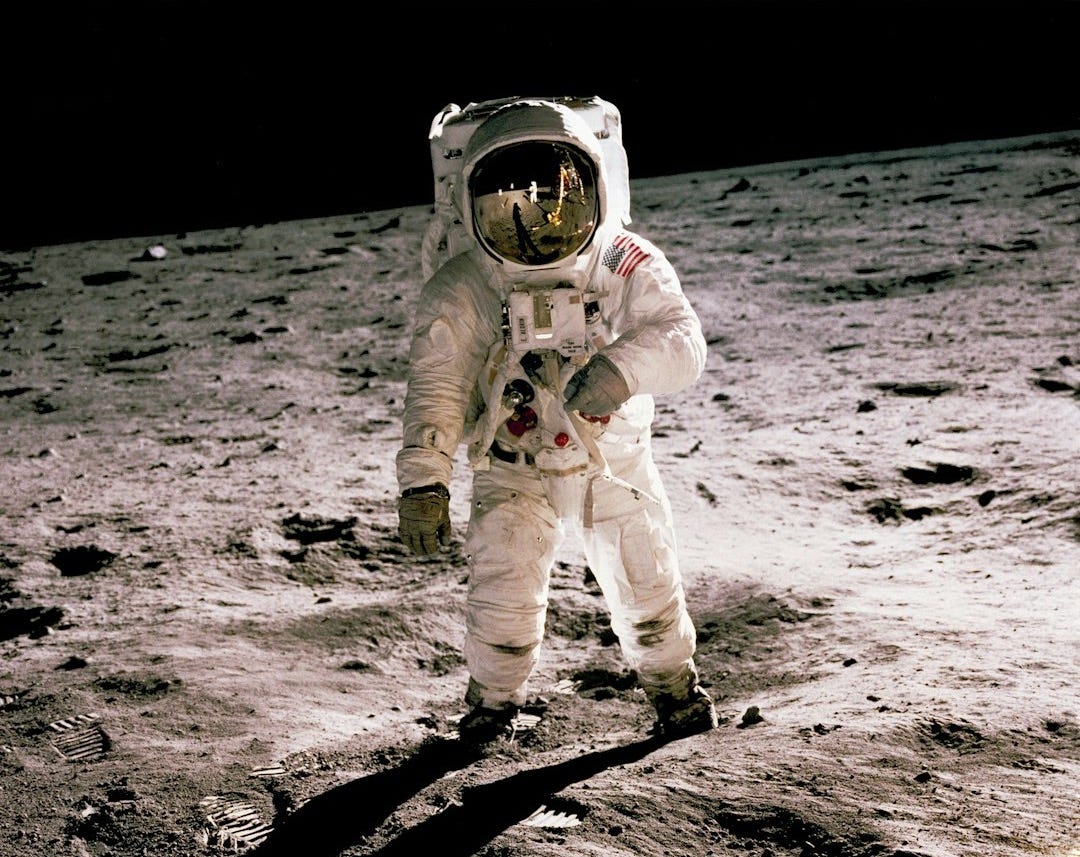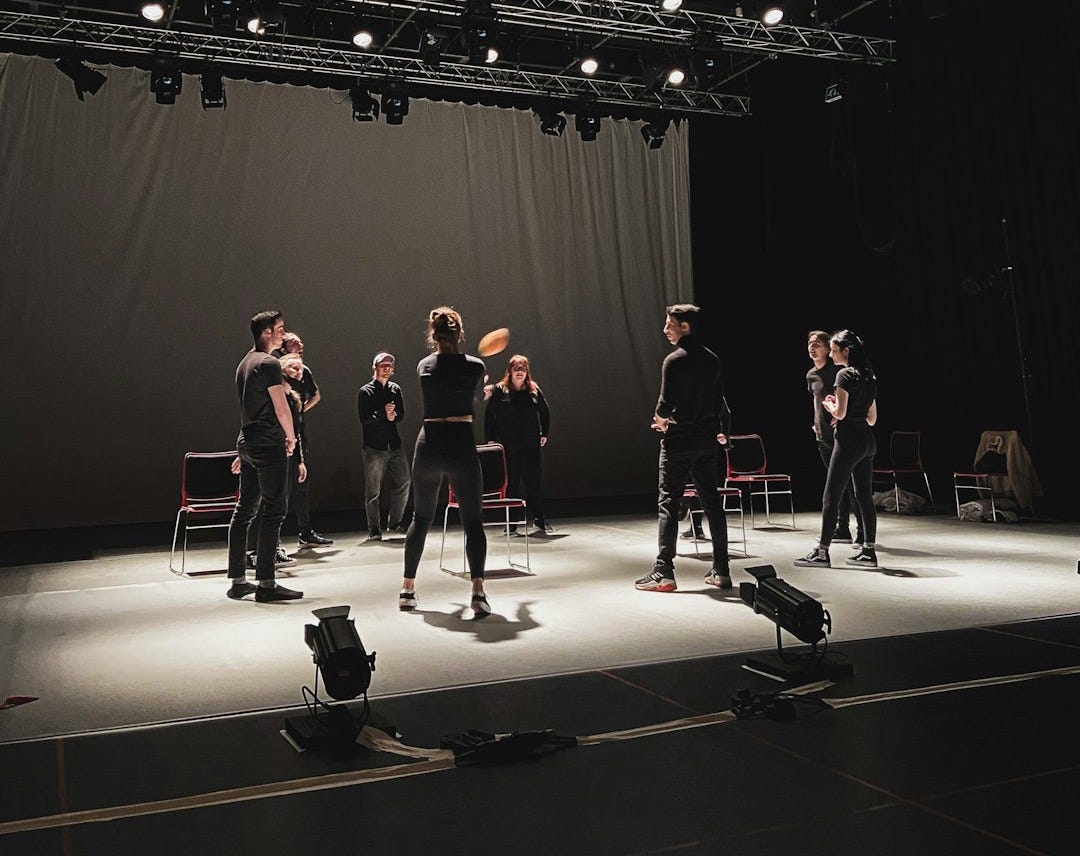
Back in the olden days of the 1970s, 80s, and 90s, “Limited Series” were lovingly referred to as “miniseries,” a cutesy diminutive intended to distinguish short-run programming from ongoing episodics with interminable narrative predictability and straight teeth.
With only a handful of exceptions, these “major television events” were overblown melodramas your Mom watched1.
That is until 1998 when lovable comic actor Tom Hanks, star of The Man with One Red Shoe, partnered with lovable comic actor Ron Howard, star of Eat My Dust!.
Together with lovable comic hairdo Brian Grazer, these mavericks produced the landmark 12-episode HBO miniseries From the Earth to the Moon, Alice, the story of bus driver Ralph Kramden and metropolitan sewer worker Ed Norton, two blue-collar nitwits bumbling through NASA’s Apollo program.2

From the Earth to the Moon, Alice swept the awards shows and prompted network execs to “roll up their sleeves” and “spitball” new-and-exciting! gobbledygook! No one would ever “miniseries” the overblown melodramas your Mom watched again!3
The Suits “kept circling back to” the phrase “Limited Series” so they “raised it up the flagpole to see who saluted.”
Too jacked-up on Red Bull and self-importance to wait for audience response cards, data tabulation, spreadsheets, and color-coded pie charts, network execs swooped.
“Miniseries” became “Limited Series” overnight. This subtle tweak of jargonistic jibber jabber disrupted the entire industry. Why, Limited Series were now picked up for a second and even third season—paradigm shift!

Too pre-occupied with hilarious comedy skits and presenter patter, the awards shows were slow to adapt and adopt the quantum leaps forward in lingo, parlance and Orwellian development-speak.
Why, the awards shows still lumped Limited Series and TV Movies under the same categorical banner!
Sure, some TV movies might be Limited Series when chopped in half (or thirds) and broadcast over consecutive nights or weeks, but most TV movies were and are feature-length films produced by and intended for first-run distribution to a television network—or in the 21st Century, a “streaming service +.”
For reallys, every movie produced and originally distributed on a streamer is a TV movie and therefore eligible to be completely ignored when lumped into the Limited Series or TV Movie category.
On this killing field, Netflix’s TV-movie-that-nobody-heard-of Rebel Ridge “competes” with Netflix’s limited series Ripley, a show that even your Mom watched. (Yes, it’s that good…Believe it, or not.)
TV movies are very different beasts than limited series. For instance, TV movies are films, or “movies,” and limited series are series, or “TV shows.” Even cinematic limited series are TV shows, in spite of the fancy-pants (and unnecessary) descriptor.
Historically, TV Movies were considered low-budget throwaway product—lurid, sensational exploitation flicks of ripped-from-the-headlines true stories, two-hour pilots for proposed series, and occasionally, sequels and reunions of long-dormant sitcoms.4
While Hallmark, Lifetime, etc. doubled-down on this tradition of disposable ho-hummery, the premium cable networks and streamers elevated the form with high production values, A-list talent and lurid, sensational exploitation flicks of ripped-from-the-headlines true stories.
However, interest in TV movies—even premier quality TV movies—has dramatically waned.
Audiences prefer bingefulness, gorging on unlimited helpings of limited series at the feeding trough of entertainment’s vomitoria.
And so, unfairly, TV movies become orphaned, lost in the lumping.

Peculiarer still, some awards shows lump Limited Series and Anthology Series together.
Sure, some modern anthology series might be limited series--Fargo, True Detective, The White Lotus, any number of whatsits from Ryan Murphy—but traditionally, anthology series featured unique storylines following different characters every standalone episode.
An episode of Black Mirror narratively works5 in a completely different way than tuning-in to characters and storylines across an overarching season.
To be fair, though, who’s got time for granularity?
Awards shows are swamped. Hilarious comedy skits and presenter patter don’t produce themselves.
Leave the ticky-tacky to The Suits and “entertainment journalists.”
Your Mom doesn’t care.6
For the record, she thinks Masters of the Air was robbed! Robbed, I tells ya!

On with the show!
LIMITED SERIES
If we extricate TV Movies and Anthology Series from the Limited Series category, the consensus across all major award shows 2024, adjusted to consider the Emmys weird schedule, goes something like this:
Baby Reindeer
Ripley
The Penguin
Disclaimer
The Sympathizer
Under the Bridge
In my humble opinion, which should be considered the final authority on the matter, Disclaimer and Under the Bridge could and probably should be swapped with Say Nothing and We Were the Lucky Ones.
Sure, Disclaimer packs a lot of star-power—Cate Blanchett, Kevin Kline and Kodi Smit-McPhee; written and directed by Alphonso Cuaron. And Under the Bridge is top-lined by Lily Gladstone, fresh off an Oscar nomination and Golden Globe victory.
You’re not gonna go be disappointed with either, but Say Nothing and We Were the Lucky Ones were both criminally overlooked.
Okay, you might be disappointed.
Absent, but also of note: Griselda and A Gentleman in Moscow.
LIMITED ANTHOLOGY SERIES
If my wonderful world of glorious granularity existed, the consensus across all major awards shows 2024, adjusted, goes something like this:
Monsters: Erik and Lyle Menendez
Feud: Capote vs the Swans
True Detective: Night Country
Fargo
American Sports Story: Aaron Hernandez
I lean toward Monsters, but only cos Fargo doesn’t really count.7 I know Javier Bardem and Cooper Koch are getting love, but that Nicholas Chavez kid who played Lyle, c’mon!
True Detective: Night Country left me wanting, and Feud: Capote vs the Swans, meh.
You’d think with that Feud cast—Naomi Watts, Chloe Sevigny, Diane Lane, Demi Moore, Calista Flockhart, Jessica Lange, Molly Ringwald, Treat Williams and Tom Hollander—the show would wallop, but there’s no wallop.8
Absent, but of note: Them: The Scare and A Very British Scandal.
TV MOVIES
I watched a whole tussie-mussie of movies produced and intended for original release on the streamers—who hasn’t?—but only a few select “TV movies” were put forward by networks as contenders for disappearing in the limited series stacked deck.
The consensus across all major award shows, adjusted:
Unfrosted
Scoop
Rebel Ridge
The Great Lillian Hall
Musica
I accidentally saw all of these.
Unfrosted should be ashamed of itself.
Scoop is a slightly different take on the latest season of A Very British Scandal, with Rufus Sewell playing Prince Andrew (Michael Sheen played Randy Andy in AVBS).
Rebel Ridge is a serviceable spin on First Blood.
The Great Lillian Hall is… not for me.
Romcom puppet musical Musica will unfortunately get lost in the shuffle. If there’s any takeaway from all this yadee yadee, it’s do yerself a favor and check this little flick out. The directorial debut of YouTube sketch comedy weirdo Rudy Mancuso, Musica feels like a Golden Age of Independent Film9 indie. A lotta movies pay lip service to subverting tropes, but few actually do in any satisfying, meaningful way.
Thoughts? Concerns? Nagging Questions?
Specifically, your Mom.
Alice Kramden and Trixie Norton played against type, portraying long-suffering astronauts’ wives as opposed to long-suffering housewives.
Again, specifically, your Mom.
You can skip the non-canonical TV movies Rescue from Gilligan’s Island and The Castaways of Gilligan’s Island, but Battle for Gilligan’s Island is required viewing in the Gilligan’s Island universe.
Or often, doesn’t work.
Your mom. My mom only watched Magnum, PI.
For most awards shows, only the last three episodes of Fargo were considered. That final episode, “Bisquik”—one of television’s finest moments.
Y’know, I found the Philip Seymour Hoffman movie without wallop, too. Maybe Truman Capote is a snore?
The Golden Age of Independent Film lasted roughly 1984-1999. Thereafter, indie films were financed and distributed by the indie film divisions of telephone service providers, theme parks and liquor distributors.




I'm more educated on TV and awards phenomena now, but I understand them way less.